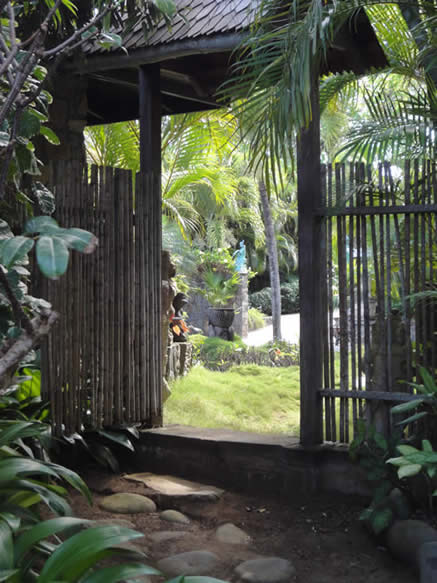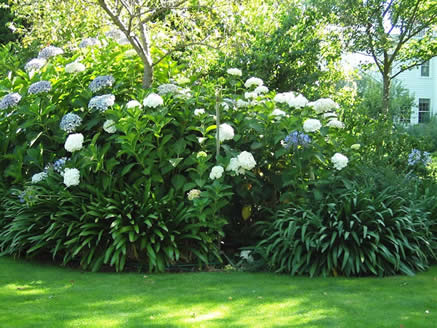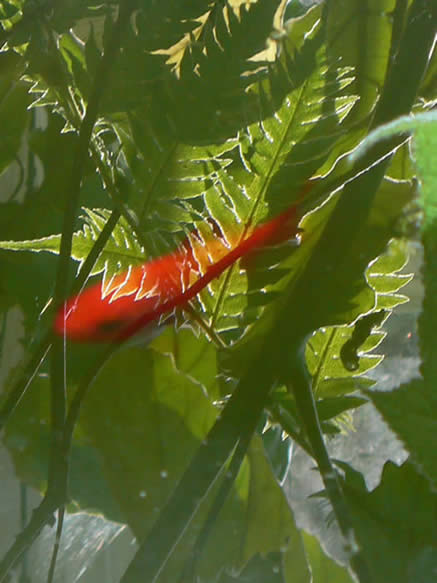Dreaming
14 May 2012
A reverie is a comfortable place to be. I have just spent ten, fifteen, I'm not sure how many minutes watching Berberis petals float over a weir: tiny flakes of gold on black water, drifting slowly, with a growing sense of purpose, over the surface of my little rock-rimmed pond.
The weir (the whole thing is tiny: the weir three inches across) acts like a magnet, mysteriously setting the surface in motion. Petals settled in the centre of the pool begin almost imperceptibly to move, gradually, gently organizing themselves to head towards the fall. Little groups of four or five move together, as though some force (could it be surface tension?) held them in
Triumphant
5 May 2012
I honestly didn't plan the look of the garden now. I would never have been so bold or single-minded, or trusted to the impact of a single flower. It is a triumph of the Triumphator. Who named this simple white lily-flowered tulip I don't know. Perhaps he or she had the same experience. The long files of bulbs I planted three or four years ago down the centre path of the garden have the stage to themselves, shining white, ice-cool on a background of tender greens, sharp green, and the bottle-bank brown/green of box hedges.
A confession
25 April 2012
When did 'dilettante' become a term of abuse? 'Amateur' no longer has the status it once had, either. I think the probable reason is that both suggest a life in which not every minute needs to be spent in gainful employment. A leisured class, indeed; 'posh boys', even.
Is there a paradox here? Leisure is what we spend most of our lives working for, only, when we achieve it, to have it despised. Meanwhile, the assumption has
Looking both ways
23 April 2012
Is this a moral dilemma, or an aesthetic one - or is it a dilemma at all?
You possess a building which all agree, monotonously, in describing as 'iconic'. One view of it, from a public road and across a riverside meadow, is as well-known (all right, then, iconic) as any view in the country. The catch is that the reverse view, from the building and its surroundings, is the public road, emphasised by traffic lights and the resulting line of the brake lights of waiting cars.
Is there an obligation on the proprietor to leave the view open, both ways, or would he be justified in planting appropriate trees to screen the road from his own viewpoint?
The building, you may even have guessed, is King's College chapel in Cambridge. During the summer coach parties of tourists make an inevitable stop to photograph the view.
Mandalay (sur Mer)
12 April 2012
My visits to the tropics have never been anything but fleeting and my impressions of tropical gardens have never advanced beyond confused admiration. Do our gardening rules, or conventions, or idioms, apply? If not, what distinguishes a garden in the tropics from a glorious hothouse display?
We are just back from the legendary island of Mustique, a speck in the Caribbean where normal rules are suspended; where tropical nature appears entirely benign. We were guests of Felix Dennis at Mandalay, his house derived from a Balinese temple and surrounded by gardens (many acres of them) that magically answer the questions I just asked. Our rules can certainly apply - and tropical colour and vigour can give them extraordinary new validity. The essence, of course, is control, as it is in gardens everywhere - but control of more powerful forces. There are plants that can grow a yard in a night, and leaves that could brain you if they fell on your head.
Mandalay, though, is almost English in its peacefulness, its composure, its slow revelations, enclosure by enclosure, of potent growth masterfully calmed. What is Balinese (swooping gables like mid-ocean waves, gates and screens, intricate carving, and solemn stone figures) speaks a visual language that justifies the cultural gap.
The Caribbean has no such language of its own: shanties and colonial porches are a pretty limited patois. But the devotional symbolism of the East (you can almost hear the chants and gongs) is at least as potent as the Greco-roman idiom of our own classic gardens.
The first gate, with its concave-gabled roof, shows you a downhill curving avenue of palms though a park of short grass mown not by sheep, as you might imagine, but by the tortoises that wander everywhere on the island. Then comes a second gate, flanked by menacing stone warriors and flaming dragons, before the first courtyard, calm, domestic, with two square fountain pools in a carpet of grass. Not grass as we know it, but a deep spongy surface that rears up in random mounds. Enormous conch shells hold water in their white basins on either side of the next gate: the front door of the single-storey house. Fire comes before water; challenge before welcome.
The opening of these great wide doors is a moment of revelation: straight ahead and far below lies the sea, scattered with
Fast forward
30 March 2012
I try not to let this diary become too meteo-centric, but there is no avoiding the topic du jour. Magnolias are going over, and horse-chestnuts are in leaf, and we are still in March. The spring of 2011 was pretty alarmingly warm, and excessively dry, but this fast-forward eruption of a season makes it moderate in comparison. We have a blackthorn summer instead of winter. The daffodils in the Royal Parks had the shortest flowering in memory: there will be none for Easter. If this sort of spring becomes a
Young Promise
28 March 2012
Tidy people with orderly minds are excluded, I'm afraid, from the sort of pleasure I had the other day rummaging in the potting shed when I noticed, buried in old seed packets and balls of string, a thick little black book.
It is our garden diary for 1975, a year when we planned and planted with an energy I only half remember. The notes are half in my hand-writing, half in another, much neater and with more complete sentences and many references to nature, as well as this kind of thing: 'April 25th. Made second sowings of lettuce, spinach, beetroot. Planted
iTrad
21 March 2012
I'd be surprised if David Hockney's iPad paintings don't inspire a whole new school of art. Apparently he emails his morning's work to chums - which must create a bit of a problem for his dealer. Are these originals? Since the difference between an original and a reproduction is the whole basis for the fine art trade I imagine some head-scratching must be going on.
iPad painting is not as easy as a real artist makes it look: witness my early effort, my tree of the month, alongside. This was done with my index finger; next step is to acquire a stylus, the sort of pen that works on a screen. I see that there are already a dozen kinds: which to choose is the next question.
I've tried two different painting apps, Brushes (apparently Hockney's medium) and My Brush - which seems to me rather simpler to use. They offer what appears to be an almost infinite range of colours, lines and washes. Also the facility not available to a student before of erasing any stroke at will, and even playing back the whole
A taste of honey
12 March 2012
I was ambushed by a blast of honey just now; an overwhelming jar-full of scent, clear, golden, sweet and even waxy. I jumped like Winnie the Pooh. The trees around are bare, a few willow catkins are opening, maples are just showing points of promise where their buds will be ……. Where are the flowers?
Then I saw, behind a screen of the fine twigs of Japanese maples, some modest
Turned inwards
9 March 2012
Reading an article on the gardens of Suzhou by John Dixon Hunt in the excellent Historic Gardens Review Historic Gardens Review reminded me of my one visit to this capital of classic Chinese gardening in 1989.
Then it was called Soochow. I took a train (with some difficulty) from Shanghai and hired a bike to join the thousands who pedalled sedately, like a steady humming river, along the avenues of this historic town. There is a flavour of Amsterdam about its canals (which were kept impeccable, at least in the centre, I remember, by men and women in punts with nets to scoop up the slightest litter).
In its concentration of gardens it could be compared with Kyoto - except that Kyoto is a city of temples and palaces in a naturally beautiful valley, while Soochow (do you say Kolkata?) is a commercial centre on a river plain. Its gardens therefore have no prospects, no interest in the world beyond, but concentrate your thoughts on the ingenuities and intricacies within their high circling walls.
Innocent pursuits
5 March 2012
The Murdoch family has had such a bad press recently that I keep remembering a visit to Dame Elisabeth, Rupert Murdoch's mother, at her garden south of Melbourne, it must be ten years ago. Ten years ago she was only 93; at 103 she remains a central figure in the cultural and charitable life of Melbourne - and a passionate gardener.
We were introduced to her at a garden festival at Hatfield House by Marchioness Mollie. We went to tea with her a year or two later at Cruden Farm, the house her husband Keith gave her when they married in 1928. There was nothing formal about it; she put the kettle on and fetched a cake tin, then told us that she had just driven to Melbourne and back (she drove herself in a small car) to chair a meeting of one of her
charities. The garden, she said, was too big to walk round, so she drove us in her buggy, stopping every few yards to point out a plant with evident knowledge and relish. There was a lot of new planting going on around a recently-made lake.
You reach Cruden Farm down a long curving alley of Corymbia citriodora, the gum tree equivalent of Betula jacquemontii, but whiter of trunk and
Solitary
4 March 2012
There may not, I suppose, be many records of the birthdays of goldfish, but mine has passed his 35th, and we are quietly celebrating together. What's more, he has passed more than 30 years of his life swimming alone, the only inhabitant of his tank in the conservatory. His companion died and I hesitated to introduce a stranger into his placid life.
I am no judge of a goldfish's state of mind; he may relish his independence, he may be lonely and depressed (or indeed he may be a she) but there he is every morning basking peacefully among the leaves. A few flakes of fish food give him obvious pleasure - but what he likes best is the hose; a jet dropped from high enough to bubble oxygen into his water. Each time I do this he swims a little jig.
His name is Diogenes, after another loner who lived in a tub - although I like to think my Diogenes is more of a philosopher.
Back to previous Trad's Diaries
|
formation. Individuals feel the same pull and move at the same speed.
I switch focus and look deeper, through clear water to snail trails (if that's what they are); paler tracks on the leaf-littered bottom. It has always baffled me how we can switch our vision from reflections to the surface, and through the surface to what lies below, with only a change of thought.
Three feet from the weir the petals change course, reset their sails and pick up speed. They keep in their flotillas, but now there is urgency in their drift, they collide, form bigger squadrons, then coalesce into a pool of gold to hurry through the gap between the rocks. They fall perhaps an inch, perhaps two, but just enough to break the surface into silver glints.
As a way of seeing the whole world it is much more interesting than a grain of sand.
Why are there no other colours? Two weeks of constant rain seem to have left most plants perplexed. The Crown Imperials have finished; one or two tentative flowers sprinkle little pink geraniums and a burgeoning perennial honesty. The apple trees are in blossom, but the colour seems washed from their petals: there is no wattage in any colour except green - and the bright lamps of White Triumphator, its pointed petals upright despite the downpours.
If it is true, as Christopher Lloyd feared, that this marvellous bulb is growing degenerate, and that its stock is weakening, it would be a terrible shame. It is seventy years old, I learn - though I still don't know who coined its strange name. But if this is weakness; three years in the ground and still standing straight after two weeks of rain; triumphator, meaning hero of a Roman 'triumph', is right.
taken hold that only 'expert' opinion is worth listening to. And an expert (disregarding the disrespectful description of 'a drip under pressure') means a person employed to know and pronounce, whether properly qualified or not.
For myself, I reclaim the name of dilettante. And even, indeed, amateur. We are people who do things for their inherent interest and the love of it. We offer views we are not technically qualified to hold - or at least not to mention. A dilettante is probably a hedonist, pleasure being his goal.
A dilettante is not so concerned with the
members of the college learn to accept the traffic across the summer view, softened by leafy trees. In winter it is different. From teatime on there is only one thing you see across the Cam from the college: winking red lights.
There are worse problems, I know. But there is also the hope of a solution, at least in part. The college has just succeeded in 'respacing' (which means felling) half the trees between the road and the river. Italian alders planted 40 years ago as a nurse-crop for oaks (this was the plan when we lost all the magnificent elms) have finally gone - in the nick of time: the oaks they were 'nursing' were almost shaded to death.
In their place are planted more oaks, lots of hawthorn, and an entirely new feature for the Backs: a crowd of Chinese dogwoods, which will make a mass of white flowers at May Ball time in June, and (I hope) colour up in an orange/harlequin way in October.
Flanking the rather stark and lonely stone Back Gate of the college we are planning to plant a pair of weeping willows: the first step in screening the intrusive traffic lights. In other words, no obvious move; just slow and sensitive improvements.

yachts. But between you and the sea lies a piece of still water reflecting the sky and meeting the sea with an invisible edge. And daily at sixo'clock the sun goes down in purple and gold in the centre of this magic mirror.
Now you are in a cloister of gleaming burnished deep brown wood carved in fantastic intricacy and filled with the colours of flowers and fish. Scarlet and silver koi dart and glide among tall blue water-lilies. Pale blue plumbago covers the banks between purple and scarlet flowers and deep green circular leaves. A gallery at one end of the cloister is open to a view of palms and distant hills. And each room off the polished corridors has a balcony revealing another kind of garden: some intense with bamboo and idols, some serenely open to the world.
There are many layers, cultural and physical, at Mandalay; of formality, for instance, from the central drawing room, frescoed as a derelict stone temple, its roof just waving palms, to studies and bedrooms and playrooms and the swimming pool, an alternative heart to the house. The pool, surrounding an island and surrounded by plants, is filled by one long cascade and spills over another, seemingly into the sea far below. I wish I could name half the plants, but among the bougainvilleas, as varied as azaleas, the hibiscus and gingers and strelitzias, heliconias and anthuriums, the frangipani trees with their white flowers on bare branches scent the night. There are layers of lower storeys too, joined by staircases and galleries among the jostling fronds of palms.
Felix Dennis is an extraordinary Maecenas, publisher, poet and author as well as the gardener who, here and in Warwickshire, orchestrates such creative planting. Even Mandalay pales beside the thousands of acres of native trees he is progressively planting for our general benefit near Stratford on Avon.
habit there will be less and less reason to grow them: a week in flower and a month looking miserable is not going to keep the popular vote.
We rarely pay our lawns much attention, but last winter there was no ignoring the moss/grass ratio. In some places it was hard to find any grass. We scraped out a small mountain of moss with a scarifier and then went to work with a great yellow machine much like the ones that leave a ribbon of tarmac behind them. Its revolving drum cuts furrows an inch and a half apart and drops grass seed from a hopper straight in. It hasn't rained for a month, though, and I fear we'll have to use the sprinkler before it's banned, any day now, to see any germination.
Helleborus corsicus behind cottage with R. rubrifolia, Hosta glauca, Asters, yellow foxglove, hebe, Viburnum fragrans. Piptanthus flowering'. (Most of which are still here).
Who was my co-diarist? His observations grow sharper: 'Potted geraniums in greenhouse. There are more in flower every day, particularly Catford Belle, which seems more dwarf than miniature. The ferns are doing well, Adiantums especially fine and the effect in the shaded corner is almost sub-tropical. First strawberry flowers out; fed with liquid fertilizer'.
Then the penny dropped. This is the last volume to record our first proper gardener, Christopher Bailes. The entry for September 13 reads 'Chris Bailes left today to go to Merrist Wood College. He has been here three years and three months'. We had suspicions then that this studious young man would go far, if not quite as far as Philip Miller's old job at the Chelsea Physic Garden, which he now adorns.

It is bewildering territory. I'm tempted to try my hand at a completely new skill - or at least hobby - simply because it's there, between my emails, my newspaper and the weather forecast. A flash in the pan, maybe, but at least a great new challenge.
spots of dull yellow. It is Lindera obtusiloba, a Chinese bush I love for its waywardly three-lobed leaves, no two quite the same, memorably bright yellow in October. The leaves are slightly scented too.
I had never noticed its little umbels of flowers before, or even known they were perfumed. I have never seen any fruit. But I wonder at the energy the plant must expend in scenting the air like this. The reproductive urge takes many wonderful forms. The twigs I brought into the kitchen are giving everything we eat and drink a taste of honey.
The gardener's art was how to make a short stroll satisfying, even exciting, within these limits. Rule one, it seems, was to keep pricking the visitor's curiosity, raising his expectations and then frustrating them. Each garden is a complex of elaborate low buildings (their roofs and eaves are very much part of the picture, curved and convoluted and decorated with dragons and creatures of all sorts). A great deal of the space between is filled with great grey rocks, as craggy or water-worn as possible. They are utterly unlike the calm solemn boulders of Kyoto; these gesticulate as though they want to move around and change places.
Often you find yourself squeezing through a claustrophobic chasm between high stones with nothing but stone to see, then emerge beside a little pool full of technicolor carp. A lacquered pavilion in the midst contains the master's desk, scrolls and pens; an icon of tranquil scholarship (or, for that matter, petty-fogging bureaucracy). He cannot, you imagine, sit there long without succumbing to one of the insistent invitations to walk: over these stepping stones, into this rockery to admire the peonies or through that moongate where the skirts of a willow – and perhaps other skirts - are beckoning.
You pass a bamboo screen and glimpse another pool, or flurry of rocks, mysteriously inaccessible. Your steps are frustrated, your exploration interrupted, your expectation raised at each turn. As John Dixon Hunt points out, it is the art of delay, of delicious foreplay. Even a moongate is a means for making you step on alone (or bow your companion through before you). But I don't think these are companionable gardens. A drinks party would be a solecism, almost an outrage. As, indeed are the crocodiles of visitors, both here and in Kyoto. Such gardens are turned inward to the point of obsession - or is it me obsessing?

more sinuous. A Rugby goalpost, as it were, with hips. Tall trees shade the white clapboard house, one of them an oak I have never seen before or since, an evergreen with leaves rather like Quercus turneri but immensely tall and as deeply drooping as a weeping beech. Its name is Q. Firthii. I want one. Hydrangeas are stacked in tall banks round the house, their feet in a lush bed of agapanthus; blue and white the predominant colours.
But any memory of the planting is hazy beside my memory of the woman who was brought home here as a bride at 19 and has reigned in the garden (and in Melbourne) ever since. The innocent pursuits of philanthropy and gardening have occupied her for eighty years.

|